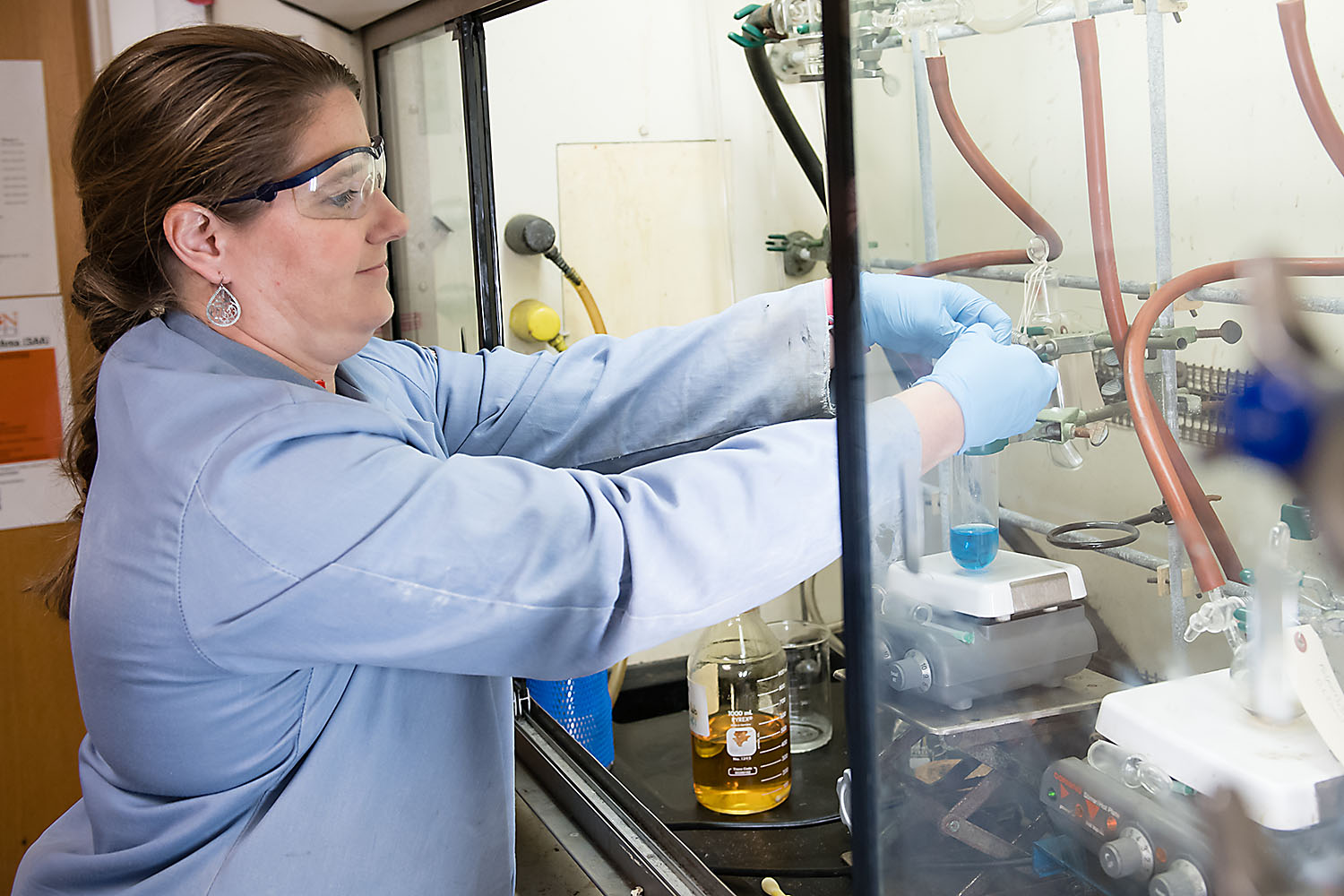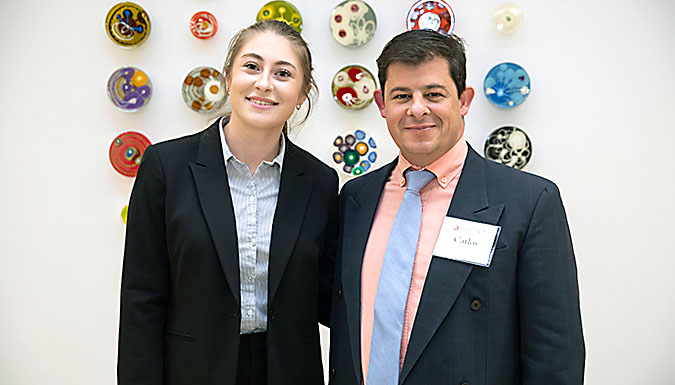Undergraduate Program Overview
 The Clemson University Department of Chemistry is one of the largest on campus and provides outstanding education for its undergraduate majors. The department also serves the entire campus by providing general chemistry education courses for a variety of other science and engineering disciplines.
The Clemson University Department of Chemistry is one of the largest on campus and provides outstanding education for its undergraduate majors. The department also serves the entire campus by providing general chemistry education courses for a variety of other science and engineering disciplines.
Undergraduates can pursue either a Bachelor of Arts degree or Bachelor of Science degree as preparation for careers that can include chemical manufacturing, electronics, textiles, biotechnology, petroleum, plastics, agriculture and food industries, and graduate study in chemistry.
Undergraduate majors are encouraged to join the chemistry club on campus, the Student Affiliates of the American Chemical Society.
Transfer AP Credits
Clemson University accepts AP test scores of 3 or above for most, but not all, courses. AP credit will translate into transfer credit, and one to four hours will be awarded for a course, meeting any degree requirements for that course.
One Department, Many Options
Which program is right for you? The Clemson University Department of Chemistry provides two undergraduate degree programs: a Bachelor of Arts degree in chemistry as well as a Bachelor of Science degree in chemistry.
For students wanting to pursue graduate or professional school, choose the program that provides the curriculum and courses of most interest. Both majors are equally acceptable when applying to medical, dental or graduate school. Both curricula also provide the opportunity to participate in research with faculty; for those in the Bachelor of Arts program, this would be accomplished by utilizing the two chemistry elective courses. Remember: Schools look at more than your academic record, but it always helps to be truly interested and invested in a major and the courses being taken.
Bachelor of Arts
The Bachelor of Arts degree gives students the broad education needed for a career dependent on a basic knowledge of chemistry.
The Bachelor of Arts degree program provides more room to explore other areas of study here at Clemson University, as students are required to complete a minor (15-plus hours) in an area outside of chemistry. Additionally, Bachelor of Arts students will complete two more semesters of a foreign language.
- More information about the curriculum is available in the online catalog.
- Prospective students: View the current undergraduate catalog. Archived catalogs may also be available for reference.
- Current students: Refer to the catalog corresponding to your year of matriculation for detailed information. Browse the Clemson University Catalog System.
Bachelor of Science
The Bachelor of Science degree prepares students for professional careers in chemistry. The Bachelor of Science degree program requires two semesters of research alongside a faculty member and three more labs within the major. There is also an additional math and physics class.
- More information about the curriculum is available in the online catalog.
- Prospective students: View the current undergraduate catalog. Archived catalogs may also be available for reference.
- Current students: Refer to the catalog corresponding to your year of matriculation for detailed information. Browse the Clemson University Catalog System.
Student Resources
New and Transfer Student Resources
-
Utilizing AP Credit Toward Your Degree
Clemson University accepts AP test scores of 3 or above for most, but not all, courses. AP credit will translate into transfer credit, and one to four hours will be awarded for a course, meeting any degree requirements for that course. Grade points will not be contributed to the student’s GPA.
Example: If a student makes a score of 3 on the AP chemistry exam, the student will automatically receive credit on their transcript for CH 1010 upon Clemson receiving the AP credit. It will count as a natural science requirement for their required general education course, and it will contribute four hours to the student’s overall number of hours completed at the University.
When registering for the AP exam, indicate if you wish to have the final results sent to Clemson University (CEEB No. 5111). Be sure to include your Social Security number when registering for AP exams. This will save time and ensure that credit is automatically awarded to your Clemson academic record.Should I Utilize AP Credit?
One of the most common questions we receive from prospective students is whether or not to utilize AP credit for CH 1010 or CH 1010/CH 1020. We suggest students go with what feels appropriate. For those with a solid chemistry foundation, start in CH 1020 and see how the first week goes. If that doesn’t seem like a good fit, you can still register to take CH 1010. There is a small window of time in the first two weeks of class in which students can move up or down based on first impressions of actually being in a course. We have quite a few chemistry majors who did well enough on the AP test to exempt CH 1010, but about half of them retook the course as a refresher, and the other half went into CH 1020. Both groups succeed equally well academically.
Determining Class Placement
If a student is anticipating AP chemistry credit, refer to the below score ranges and class placements.
- AP chemistry score 1: No Clemson credit; placement in CH 1010 (General Chemistry Part 1).
- AP chemistry score 2: No Clemson credit; placement in CH 1010 (General Chemistry Part 1).
- AP chemistry score 3: Clemson credit for CH 1010; placement in CH 1020 (General Chemistry Part 2).
- AP chemistry score 4: Clemson credit for CH 1010; placement in CH 1020 (General Chemistry Part 2).
- AP chemistry score 5: Clemson credit for CH 1010 and CH 1020; placement in CH 2230 (Organic Chemistry Part 1).
-
International Baccalaureate Credit
International Baccalaureate credit is awarded in much the same way as AP credit. The credit hours will be applied to the student’s transcript and any degree requirement the course meets will be considered completed. Students wanting to use IB credit must put their IB number in the space provided on the Clemson application.
-
New Student/Transfer Orientation Information
Orientation
New and transfer student orientation is held regularly.
Prerequisites
CH 1010 prerequisite/co-requisite: There are no prerequisites or co-requisites for CH 1010, but we highly encourage students who register to have already have earned a C or better in MATH 1010 or MATH 1020 or MATH 1030, or concurrent enrollment in MATH 1040, 1060, 1080, 2060, 2080 or STAT 2300.
CH 1020 prerequisites: The pre-requisite for enrollment in CH 1020 (General Chemistry Part 2) is completion of CH 1010 with a C or better. Students are still responsible for meeting the prerequisite prior to the start of classes. This is not a permanent section of CH 1020. It is a temporary mechanism to track students anticipating eventual entry into the class.
CH 2230 prerequisite: The prerequisite for CH 2230 is completion of CH 1020 with a D or better. Students are still responsible for meeting the prerequisite prior to the start of classes. This is not a permanent section of CH 2230. It is a temporary mechanism to track students anticipating eventual entry into the class.
CH 1010 Section Restrictions
- Sections 001 to 014: No restrictions, but in-person attendance enforced, no online accommodations.
- Section 041: Online synchronous only.
- Section 050: Chemistry major students only.
- Section 072: Honors students only.
Holding Sections
There are no holding sections for chemistry classes. Once a student has received transfer credit(s) and/or AP credit(s), please email a PDF or screenshot to Christy Lester. Include:
- Student’s full name
- Student’s CUID number
- The name of the other college, and location of the college
- The name of the chemistry class and/or lab
- The grade of the chemistry class and/or lab
Once verifications of their class in TCEL, overrides will be given for the desired chemistry class and/or lab.
-
Academic Advising
Academic advising is an integral part of the College of Science commitment to help students meet their academic and personal goals. The college operates on a split-advising model. A team of professional staff advisers works with first-year students to ensure they are in the correct major and are making satisfactory academic progress. Continuing students in chemistry are assigned faculty members who monitor their academic progress and help them select courses at each registration period. Faculty and staff advisers begin working with students at new student orientation and continue to work closely with them throughout their academic careers.
-
General Chemistry Lab Exemption
Students entitled to lab exemptions will be dropped from current lab sections and put in an exempt lab section. Studentsd will still be required to pay lab fees, but will not be required to attend the lab. In order to claim credit, prior grade must be 75% or higher. Students are required to pay lab fees in order for the University to award students 4 credit hours for the course.
Beyond the Classroom
The College of Science is home to a multitude of programs to assist first-year and continuing students in their coursework and life outside the classroom here at Clemson.
-
COSMIC
COSMIC is the College of Science Mentoring and Inclusion Collaborative. It is an award-winning peer mentoring program intended to support incoming students with their transition to Clemson by matching them with upperclassmen mentors who come from similar backgrounds and share similar interests.
Affinity groups in the COSMIC Ecosystem include women, men, military and veteran students; first-generation students; transfer students; students with disabilities; students of color; and LGBTQIA+ students. COSMIC also offers faculty and staff liaisons who provide academic support to mentors and mentees. This is truly an inclusive program at Clemson University, providing cross-cultural collaboration and engagement.
To find those upperclassmen, incoming students will complete a COSMIC mentee application that shares their experiences and interests. The applications will then be matched with mentors based on the above-mentioned criteria. Mentors will help their mentees navigate college life by checking in, setting goals, answering questions and providing support. Any student admitted to the university as a College of Science major is eligible to apply. Acceptance into the program, however, is on a first-come, first-served basis.
-
RISE: Residents in Science and Engineering
Residents in Science and Engineering living-learning xommunity is a first-year transition program in conjunction with being a unique living-learning experience. Clemson RISE provides opportunities for first-year STEM students to write their own Clemson stories. The mission of the RISE is to assist students in their transition to college by combining the academic and residential experiences in order to foster academic success and facilitate professional development.
READY TO TAKE THE NEXT STEP?
Apply to the Department of Chemistry

What Clemson is All About
Don’t Underestimate the Importance of Connection
Lauren Skrajewski, an undergraduate student in chemistry who graduated in May 2019, came to Clemson from New Jersey, “because of the known academic excellence and family-oriented reputation.” She didn’t initially major in chemistry, changing her major after her first year. “After I made the change, the chemistry department welcomed me with open arms,” she says. Her adviser, Carlos Garcia, provided her with research opportunities, connections to collaborative projects, internships and more. “Dr. Garcia has taught me the importance of work ethic, presentation skills, and the importance of meeting different people,” she says.
